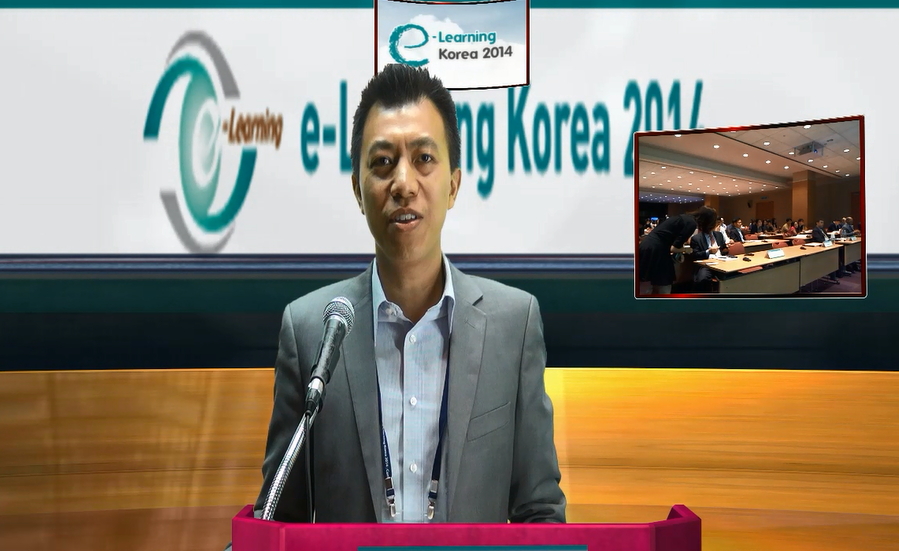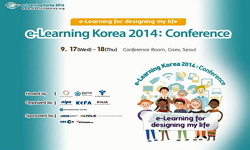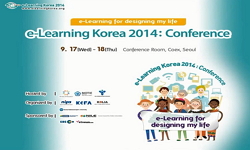This research was purposed to investigate adult learners' 2x2 goal orientation and the relationship with self-regulated learning in e-Learning environments. A survey was conducted to the 153 adult learners who attended cyber graduate school. The resea...
http://chineseinput.net/에서 pinyin(병음)방식으로 중국어를 변환할 수 있습니다.
변환된 중국어를 복사하여 사용하시면 됩니다.
- 中文 을 입력하시려면 zhongwen을 입력하시고 space를누르시면됩니다.
- 北京 을 입력하시려면 beijing을 입력하시고 space를 누르시면 됩니다.

e-Learning 환경에서 성인학습자의 2x2 성취목표지향성과 자기조절학습에 관한 연구 = Investigation of adult learners' 2x2 achievement goal orientation and self-regulated learning in e-Learning environments
한글로보기부가정보
다국어 초록 (Multilingual Abstract)
This research was purposed to investigate adult learners' 2x2 goal orientation and the relationship with self-regulated learning in e-Learning environments. A survey was conducted to the 153 adult learners who attended cyber graduate school. The research findings were as follows : The first, mastery-approach was the most prevailing goal orientation, and the most of factors in self-regulated learning were over the middle score, Specially, the scores of task-value, elaboration, control of efforts were high among those of self-regulated learning. The second, goal type which was high in four goal orientations was the most frequent. The adaptive goal types to self-regulated learning were high in mastery approach and performance approach, and only high in mastery-approach, the other side, unfavorable goal types to self-regulated learning were low in mastery and performance approach, only high in performance-approach. The third, mastery-approach goal was positively correlated with all of self-regulated learning except help-seeking, and the most powerful factors to predict self-regulated learning positively. Performance-approach goal was partially related with self-regulated learning, but had no meaningful influences on self-regulated learning except self-efficacy. Mastery-avoidance goal and performance avoidance goal were not positive predictors of self-regulated learning. Consequently, to the adult learners by comparison with young students in classroom, mastery approach goal orientation had greater influences but performance goal orientation had less influences on self-regulated learning. Also, avoidance goal orientation would be mal-adaptive in self-regulated learning.
국문 초록 (Abstract)
성인학습자들은 숙달목표지향성이 다른 목표지향성에 비해 월등히 높았으며 자기조절학습 수준도 전반적으로 높았으나 특히 과제가치, 정교화, 노력조절 요인이 높게 나타났다. 4요인 구조에서 가능한 16가지 성취목표유형의 비율은 4개의 성취목표가 모두 높은 복합적 유형이 가장 많았다. 이러한 16개의 성취목표지향성 유형에 따른 자기조절학습 요인별 평균점수를 비교했을 때 숙달과 수행접근이 모두 높은 유형이 가장 유리했고 다음으로 접근 성향 가운데 숙달접근이 높은 유형의 자기조절학습 점수가 높게 나타났다. 반면 접근성향이 모두 낮거나 수행접근만 높은 목표유형은 자기조절학습 점수가 상대적으로 낮게 나타났다. 상관분석 및 회귀분석 결과를 보면 숙달접근목표는 도움구하기를 제외한 모든 자기조절학습 요인과 정적 관계를 가지고 있었고 자기조절학습을 유의미하게 설명할 수 있는 가장 영향력 있는 목표지향성이었다. 수행접근목표도 일부 자기조절학습 요인과 정적 상관을 가지고 있었으나 이들 요소를 유의미하게 예측할 수 있는 설명 변인으로서의 영향력은 자기효능감을 제외하고는 없었다. 숙달회피와 수행회피는 자기조절학습에 유의미한 영향을 주지 못하거나 일부 요인에 부정적 영향을 주는 것으로 나타났다.
이 연구는 성인학습자의 주된 학습 수단으로 부상된 e-Learning 환경에서 성취목표지향성이 자기조절학습에 미치는 영향을 파악하기 위해 수행되었다. 특히 성취목표지향성은 이론적 변화를 ...
이 연구는 성인학습자의 주된 학습 수단으로 부상된 e-Learning 환경에서 성취목표지향성이 자기조절학습에 미치는 영향을 파악하기 위해 수행되었다. 특히 성취목표지향성은 이론적 변화를 거쳐 2x2체제의 4요인구조가 제시되고 있어 새로운 성취목표지향성 체제 하에서 성인학습자의 자기조절학습과의 관련성을 분석해 볼 필요성이 제기되었다. 이를 위해 선행 연구에서 개발된 자기조절학습과 2x2 성취목표지향성 측정 도구를 기반으로 원격대학원의 30세 이상 성인학습자 153명을 대상으로 e-mail 설문이 실시되었으며 연구 결과는 다음과 같다.
성인학습자들은 숙달목표지향성이 다른 목표지향성에 비해 월등히 높았으며 자기조절학습 수준도 전반적으로 높았으나 특히 과제가치, 정교화, 노력조절 요인이 높게 나타났다. 4요인 구조에서 가능한 16가지 성취목표유형의 비율은 4개의 성취목표가 모두 높은 복합적 유형이 가장 많았다. 이러한 16개의 성취목표지향성 유형에 따른 자기조절학습 요인별 평균점수를 비교했을 때 숙달과 수행접근이 모두 높은 유형이 가장 유리했고 다음으로 접근 성향 가운데 숙달접근이 높은 유형의 자기조절학습 점수가 높게 나타났다. 반면 접근성향이 모두 낮거나 수행접근만 높은 목표유형은 자기조절학습 점수가 상대적으로 낮게 나타났다. 상관분석 및 회귀분석 결과를 보면 숙달접근목표는 도움구하기를 제외한 모든 자기조절학습 요인과 정적 관계를 가지고 있었고 자기조절학습을 유의미하게 설명할 수 있는 가장 영향력 있는 목표지향성이었다. 수행접근목표도 일부 자기조절학습 요인과 정적 상관을 가지고 있었으나 이들 요소를 유의미하게 예측할 수 있는 설명 변인으로서의 영향력은 자기효능감을 제외하고는 없었다. 숙달회피와 수행회피는 자기조절학습에 유의미한 영향을 주지 못하거나 일부 요인에 부정적 영향을 주는 것으로 나타났다.
참고문헌 (Reference)
1 이주화, "학업적 성취목표지향성 척도 개발" 한국교육심리학회 19 (19): 311-326, 2005
2 김태은, "학교급별 학업능력에 대한 학습효능감, 학습동기화, 성취목표지향성의 효과" 한국교육심리학회 21 (21): 185-207, 2007
3 현주, "학교급별 성취목표지향성이자기효능감과 학교적응에 미치는 영향" 한국교육심리학회 20 (20): 443-465, 2006
4 교육인적자원부, "평생교육통계조사 주요 결과" 평생교육진흥원 온라인 자료실 2007
5 권금상, "평생교육을 위한 미디어 교육의 활용" 28 (28): 45-61, 2007
6 한순미, "중다목표관점에서의 성취목표와 자기조절 학습전략 사용간의 관계" 한국교육심리학회 17 (17): 291-312, 2003
7 최병연, "자기효능감, 성취목표지향성, 학습전략 및 학업성취간의 관계분석" 10 : 227-253, 1998
8 박승호, "자기조절학습의 발달을 위한 동기적 요인의 역할" 한국교육심리학회 17 (17): 55-70, 2003
9 송인섭, "인간의 자아개념 탐구" 학지사 1998
10 이윤희, "온라인 탐구기반학습에서 학습자의 목표지향성, 자기조절학습전략, 학업성취도의 관계규명" 이화여자대학교 대학원 2003
1 이주화, "학업적 성취목표지향성 척도 개발" 한국교육심리학회 19 (19): 311-326, 2005
2 김태은, "학교급별 학업능력에 대한 학습효능감, 학습동기화, 성취목표지향성의 효과" 한국교육심리학회 21 (21): 185-207, 2007
3 현주, "학교급별 성취목표지향성이자기효능감과 학교적응에 미치는 영향" 한국교육심리학회 20 (20): 443-465, 2006
4 교육인적자원부, "평생교육통계조사 주요 결과" 평생교육진흥원 온라인 자료실 2007
5 권금상, "평생교육을 위한 미디어 교육의 활용" 28 (28): 45-61, 2007
6 한순미, "중다목표관점에서의 성취목표와 자기조절 학습전략 사용간의 관계" 한국교육심리학회 17 (17): 291-312, 2003
7 최병연, "자기효능감, 성취목표지향성, 학습전략 및 학업성취간의 관계분석" 10 : 227-253, 1998
8 박승호, "자기조절학습의 발달을 위한 동기적 요인의 역할" 한국교육심리학회 17 (17): 55-70, 2003
9 송인섭, "인간의 자아개념 탐구" 학지사 1998
10 이윤희, "온라인 탐구기반학습에서 학습자의 목표지향성, 자기조절학습전략, 학업성취도의 관계규명" 이화여자대학교 대학원 2003
11 한상훈, "성인학습자의 학습동기와 자기주도학습의 관계" 학습자중심교과교육학회 7 (7): 355-374, 2007
12 이경아, "성인학습자의 자기효능감과 학습전략 간의 상관관계 연구" 10 (10): 19-45, 2004
13 김희수, "성인학습자의 목표지향성과 자기효능감에 관한 연구: 교육과정 및 연령을 중심으로" 교육과학연구소 38 (38): 247-266, 2007
14 성현숙, "성인학습자 집단간의 자기조절학습전략 사용, 동기의 차이와 학업성취와의 관계" 한국교육심리학회 17 (17): 333-354, 2003
15 권대봉, "성인교육방법론" 학지사 1999
16 황정문, "목표지향성과 수학과 성취도 및 학습동기관련 변인과의 관계" 한국교육심리학회 17 (17): 77-98, 2003
17 송인섭, "목표지향성, 자기조절학습, 학업성취와의 관계 연구" 14 (14): 29-62, 2000
18 권성연, "대학생의 목표지향성과 자기효능감의관계 분석" 학습자중심교과교육학회 7 (7): 49-71, 2007
19 김아영, "교실에서의 동기" 한국교육심리학회 17 (17): 5-36, 2003
20 이수경, "e-Learning 환경에서 학습자 및 학습과정 특성에 따른 학습전략 차이 분석" 한국교육정보미디어학회 13 (13): 53-78, 2007
21 Elliot, A. J., "a hierarchical model of approach and avoidance achievement motivation" 72 : 218-232, 1997
22 Radosevich, D. J., "The influence of a four-factor goal orientation model on motivational processes and performance" 7 (7): 114-130, 2007
23 Meece, J. L., "Students' goal and cognitive engagement in classroom activities" 80 (80): 514-523, 1988
24 Dweck, C. S., "Self-theories : Their role in motivation, personality, and development" Psychology Press 1999
25 Schunk, D. H., "Self-regulation of learning and performance : Issues and educational applications" Erlbaum 1994
26 Skaalvik, E., "Self-enhancing and self-defeating ego orientation : Relations with task avoidance orientation, achievement, self-perceptions, and anxiety" 89 (89): 71-81, 1997
27 Harackiewicz, J. M., "Rethinking achievement goals: When are they adaptive for college students and why?" 33 : 1-21, 1998
28 Perry, N. E., "Preparing student teachers to support for self-regulated learning" 106 : 237-254, 2006
29 Pintrich, P. R., "Multiple goals, multiple pathways : The role of goal orientation in learning and achievement" 92 : 544-555, 2000
30 Dweck, C. S., "Motivational processes affecting learning" 41 : 1040-1048, 1986
31 Pintrich, P. R., "Motivation in education : Theory, research and applications" Merill Prentice Hall 2002
32 Elliot, E. S., "Goals : An approach to motivation and achievement" 54 : 5-12, 1988
33 Zimmerman, B. J., "Dimensions of academic self-regulated learning, In Self-regulation of learning and performance: Issues and educational applications" Erlbaum 1994
34 Guglielmino, L. M., "Development of the self-directed learning readiness scale" The University of Georgia 1977
35 Ames, C., "Classrooms : Goals, structures and student motivation" 84 : 261-271, 1992
36 Urdan, T. C., "Beyond a two-goal theory of motivation and achievement : A case for social goals" 65 (65): 213-243, 1995
37 Middleton, M. J., "Avoiding the demonstration of lack of ability : An underexplored aspect of goal theory" 89 : 710-718, 1997
38 Wolters, C. A., "Assessing academic self-regulated learning. Paper prepared for the conference on Indicators of positive development: definitions, measures, and prospective validity" 2003
39 Elliot, A. J., "Approach and avoidance motivation and achievement goals" 34 : 169-189, 1999
40 Elliot, A. J., "Approach and avoidance achievement goals and intrinsic motivation : a mediational analysis" 70 : 461-475, 1996
41 Weiner, "An attributional theory of motivation and emotion" Springer-Verlag 1986
42 Pintrich, P. R., "An achievement goal theory perspective on issues in motivation terminology, theory, and research" 25 : 92-104, 2000
43 Nicholls, J., "Achievement motivation : Conceptions of ability, subjective experience, task choice, and performance" 91 : 328-326, 1984
44 Ames, C., "Achievement goals in the classroom : Students' learning strategies and motivation processes" 80 (80): 260-267, 1988
45 Barron, K. E., "Achievement goals and optimal motivation : testing multiple goal models" 80 : 706-722, 2001
46 Urdan, T., "Achievement goal theory: Past results, future directions, In Advances in motivation and achievement" JAI 1997
47 Dweck, C. S., "A social-cognitive approach to motivation and personality" 95 : 256-273, 1988
48 Pintrich, P. R., "A manual for the use of the motivated strategies for learning questionnaire(MSLQ)" University of Michigan 1991
49 Elliot, A. J., "A 2 x 2 achievement goal framework" 80 : 501-519, 2001
50 윤미선, "2요인 중다목표관점에 의한 성취목표지향성과 성별에 따른 중고생의 과학교과 흥미" 한국교육방법학회 19 (19): 1-19, 2007
51 권성연, "2x2 성취목표지향성과 자기조절학습의 관계" 한국교육공학회 24 (24): 213-240, 2008
52 박병기, "2x2 성취목표지향성 척도의 개발 및 타당화" 한국교육심리학회 19 (19): 327-353, 2005
53 양명희, "2*2 성취목표지향성과 자기조절학습과의 관련성 검토" 한국교육심리학회 20 (20): 745-764, 2006
동일학술지(권/호) 다른 논문
-
- 학습자중심교과교육학회
- 김병수
- 2008
- KCI등재
-
중등 교사양성과정의 교육실습에서 예비교사들의 교과교육학지식 개발
- 학습자중심교과교육학회
- 박성혜
- 2008
- KCI등재
-
e-러닝에서 스캐폴딩 제시방법과 인지양식이 문제해결과정에 미치는 효과
- 학습자중심교과교육학회
- 박형성
- 2008
- KCI등재
-
- 학습자중심교과교육학회
- 김정환
- 2008
- KCI등재
분석정보
인용정보 인용지수 설명보기
학술지 이력
| 연월일 | 이력구분 | 이력상세 | 등재구분 |
|---|---|---|---|
| 2027 | 평가예정 | 재인증평가 신청대상 (재인증) | |
| 2021-01-01 | 평가 | 등재학술지 유지 (재인증) |  |
| 2018-01-01 | 평가 | 등재학술지 유지 (등재유지) |  |
| 2015-01-01 | 평가 | 등재학술지 유지 (등재유지) |  |
| 2011-01-01 | 평가 | 등재학술지 유지 (등재유지) |  |
| 2008-01-01 | 평가 | 등재학술지 선정 (등재후보2차) |  |
| 2007-01-01 | 평가 | 등재후보 1차 PASS (등재후보1차) |  |
| 2006-01-06 | 학술지명변경 | 외국어명 : Journal of Learner-Centered Curriculum and Instruction -> The Journal of Learner-Centered Curriculum and Instruction |  |
| 2006-01-01 | 평가 | 등재후보학술지 유지 (등재후보1차) |  |
| 2004-01-01 | 평가 | 등재후보학술지 선정 (신규평가) |  |
학술지 인용정보
| 기준연도 | WOS-KCI 통합IF(2년) | KCIF(2년) | KCIF(3년) |
|---|---|---|---|
| 2016 | 1.29 | 1.29 | 1.31 |
| KCIF(4년) | KCIF(5년) | 중심성지수(3년) | 즉시성지수 |
| 1.37 | 1.42 | 1.436 | 0.33 |
연관 공개강의(KOCW)
-

2014 이러닝 국제 콘퍼런스 : Education Technology with Moonshot Thinking
한국교육학술정보원 Suan Yeo -

2014 이러닝 국제 콘퍼런스 : Whats Wrong with e-books and How to Fix It
한국교육학술정보원 Joseph Noble -

2014 이러닝 국제 콘퍼런스: Analysis of e-Learning Program Management for Adults in Korea
한국교육정보진흥협회 Don-Min, Choi -

2014 이러닝 국제 콘퍼런스 : Utilizing Education System through Open Source: Using Columbia Case
한국교육학술정보원 In-Sik, Yoo -

2014 이러닝 국제 콘퍼런스 : Developing the PETAL e-Learning Platform~
한국교육정보진흥협회 Vincent Tam




 KCI
KCI

